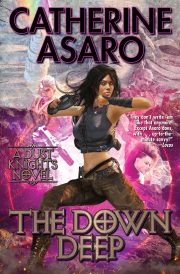What Technology Can’t SF Writers Live Without?
by Julie Nováková
SF authors are accustomed to creating intelligent spaceships, spinning space stations, flying cars or super-advanced robots, but what real-world technology can’t they live without in their everyday life, especially with relation to their writing process? Authors from the upcoming Life Beyond Us anthology answer this question.
When I started editing an anthology of SF stories centered around alien life, each accompanied by a short essay on the science of the story, naturally I was curious about what sciences or technologies inspire the contributing authors, how their process works and how they rely on technology. Conducting a mini-interview with each author, I asked, among other things, whether there’s any technology they can’t imagine to live without. Think for a moment what it would be for you. Some piece of 21st century technology, or something vital developed thousands of years ago? Something to guide your writing process, or indispensable in your life regardless of the craft?
Many writers (including myself, after all) can’t imagine working without computers. Rich Larson says: “Over half my day is spent on my netbook.” He uses it for around ten hours of writing and other work, and then for recreation and socialization. At night, its USB port powers the small fan that lets him sleep. “It’s basically a vital organ!”
“My Bose QC 35 wireless headphones,” says Tobias S. Buckell. They help him create a focusing space around himself. “The ritual of turning on noise canceling and hearing the world around me drop into background; it’s this trigger for focus that really helps me,” he adds.
Eugen Bacon admits her “terrible reliance” on her smartphone. “It’s my alarm, my torch, my calculator, my notepad, my calendar, my thesaurus, my GPS, my book, my news, my connection with the world. Sometimes it’s my comfort—the one thing I hold close to my chest when I’m contemplating. I’m frightened by how much power I’ve given this device.”
Internet is definitely the deal-breaker for Lucie Lukačovičová, who loves venturing into new fields of knowledge and devours articles, whether she needs them for creating fantasy, science fiction or just out of interest—because you never know where a new great idea springs from, right?
But not all of it applies directly to writing—writers need to live as people, after all! We’re so accustomed to many technologies that we perceive them as obvious—but are they? “Weaving,” was Mary Robinette Kowal’s answer. “I am completely uninterested in wearing felt and leather full time.”
Agreed! That might get a tad uncomfortable, especially in the long hours at the computer. Remembering to feed yourself is also vital—and Eric Choi mentioned his rice cooker not just for food preparation, but also mask sterilization, an essential thing to do in the current pandemic. Modern medical technology was mentioned both by Tessa Fisher and Julie E. Czerneda, who also added in line with what Lucie Lukačovičová said: “‘Can’t’ would include modern medicine, food and energy production, shipping and more. ‘Won’t’ is more within my grasp. We definitely shopped for our latest home based on where we could get high speed internet. To be connected these days is vital.”
Juggling the occasional Zoom meeting while helping my daughter assemble a toy railroad or create a sandcastle, I cannot but agree. Internet connection, especially in times of social distancing, is crucial, just as a smartphone is when I need to send a quick email or tweet about the kickstarter for Life Beyond Us during the day. Evenings, sometimes blending into nights, are the quiet work time at my laptop.
Swiping on a smartphone screen, dictating and having the recording transcribed, hitting the keyboard of your laptop on a quiet park bench on a sunny afternoon, closing yourself in your room with ambient light and no noise, or writing into a paper notebook with a fountain pen—all of those are viable writing strategies. Some require more solitude, time, or resources; some are easier to combine with a busy job or raising children. But you need to find out which ones work best for you, whether you can make compromises or not. Maybe you can write anywhere, anytime, on basically anything; maybe you need more specific conditions. Both ways are valid, of course. There is no single “universally best” way to write, whether you’re thinking of the writing environment, plotting or anything else in the craft, and each of us depends on slightly different technologies.
However, I think we can all agree on the answer D.A. Xiaolin Spires gave me when asked what technology she can’t live without: “Writing!”

Julie Nováková is a scientist, educator and award-winning Czech author of science fiction and detective stories. Her work has appeared in Asimov’s, Analog, Clarkesworld and elsewhere. She’s a member of the XPRIZE Sci-fi Advisory Council and is active in science outreach, education and nonfiction writing. She’s currently co-editing Life Beyond Us (Laksa Media & European Astrobiology Institute), an anthology of 22 SF stories by award-winning authors and 22 essays by scientists, revolving around astrobiology—from extreme life on Earth all the way to detecting alien civilizations. Her aim is to publish brilliant, innovative SF and at the same time increase science understanding and interest in STEM.


